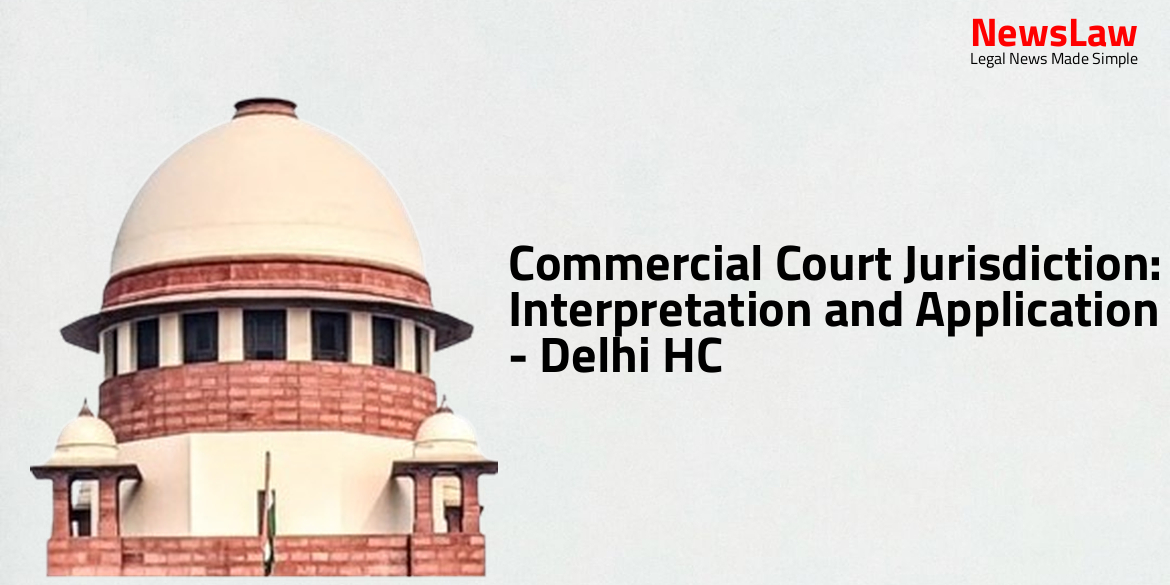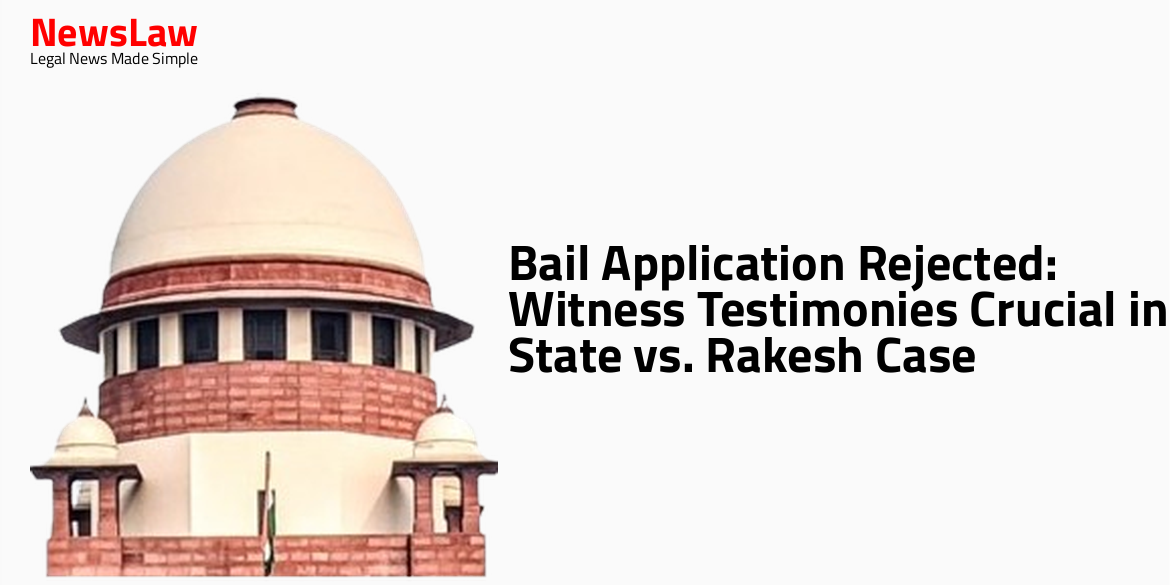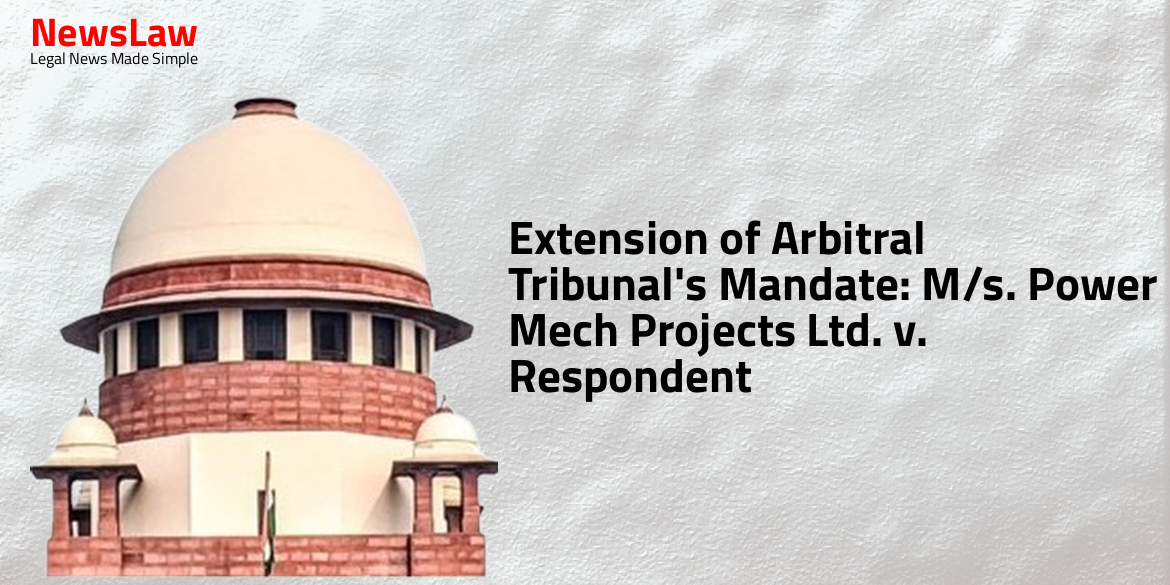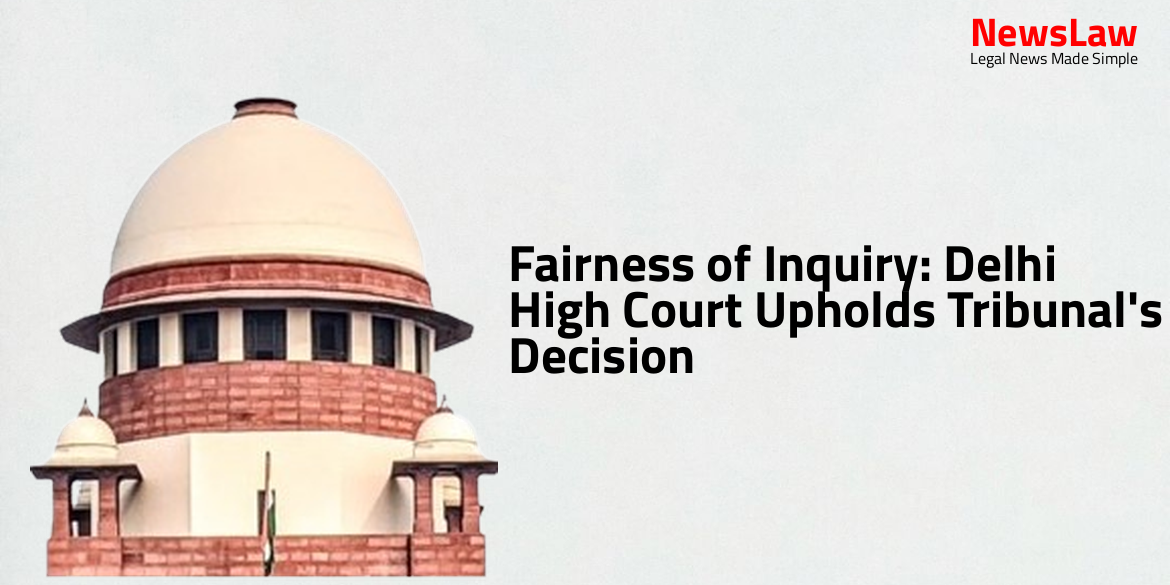Diving into a significant legal judgment by the Delhi High Court regarding commercial court jurisdiction, focusing on interpretation and application. The case delves into the complexities of defining and categorizing commercial disputes, shedding light on the intricacies of the law. Stay informed on the latest developments in commercial court proceedings with this insightful analysis.
Issue
- The plaintiff was employed as VP-Engineering by the defendant company with specific terms in the Appointment Letter cum Employment Agreement.
- The plaintiff was supposed to join the company in Abu Dhabi but joined in New Delhi due to logistical issues.
- The plaintiff and his family were later sent to Abu Dhabi on a tourist visa, but the company failed to secure a work permit for him.
- As a result, the plaintiff had to return to the trial court to dismiss the suit.
Arguments
- The petitioner’s counsel argued that the relationship between the parties was commercial and contractual, as both parties were making profits.
- Referred to Supreme Court decisions to support the argument that an employment contract is a ‘contract of service’ falling under ‘agreement for provision of service’ in the Commercial Courts Act.
- Emphasized that the concept of employment includes employer, employee, and the contract of employment.
- Opposed the respondent’s claim that it was a pure ‘contract of service’ and not covered under the Commercial Courts Act.
- Stressed that a strict interpretation akin to taxing statutes was not suitable in the case of jurisdictional issues.
- The counsel for the petitioner argued for a broader interpretation of the dispute as a commercial dispute.
- The decision in Sanjay Kumar v. Elior India Food Services LLP was challenged as not being applicable to the present case.
- Cases like Arvind Processing Park Pvt. Ltd v. Mayursinh Bhupathsinh Vaghela were cited to support a purposive interpretation.
- The distinction between ‘contract of service’ and ‘contract for service’ was emphasized.
- Precedents like Narendra Kumar v. Om Daily Needs Retailing Pvt. Ltd. were referenced to support the argument.
- The petitioner’s counsel relied on cases such as Frost International Ltd. v. Milan Developers & Builders Pvt. Ltd. for their position.
- The need for a holistic and purposive interpretation was reiterated by citing various cases including Ambalal Sarabhai Enterprises Ltd. v. K.S. INfraspace LLP.
- The argument for a purposive interpretation was further supported by cases like Gurudevdatta VKSSS Maryadit v. State of Maharashtra.
Analysis
- The analysis focuses on the interpretation of the term ‘commercial disputes’ as provided under the Act.
- The Act aims for early disposal of high-value commercial disputes through Commercial Courts.
- Strict interpretation of the Act’s provisions is crucial for expediting the resolution of commercial disputes.
- The judgment emphasizes the need to entertain only disputes that fit the definition of ‘commercial disputes.’
- Reference is made to the exclusion of certain types of litigation from Commercial Courts to avoid clogging the system.
- The importance of reflecting the nature of the dispute and jurisdiction in the suit’s pleadings is highlighted.
- The court’s role in ensuring the fast tracking of commercial disputes is underscored.
- The significance of closely examining the pleadings to determine if a dispute qualifies as a commercial one is stressed.
- The need for a purposive interpretation of the Act to achieve its objectives is reiterated.
- An in-depth analysis is conducted on the types of contracts and transactions that fall under commercial disputes.
- The judgment discusses how the legislative intent behind the Act would be defeated if every suit filed before a Commercial Court is entertained.
- The role of pleadings in conferring jurisdiction in civil suits is discussed in the context of commercial disputes.
- The requirement for the actual use of immovable property in trade or commerce to qualify as a commercial dispute is emphasized.
- The plea to avoid expanding the scope of the Act beyond its literal interpretation is highlighted to maintain legislative intent.
- Key points on the nature of work, business contracts, service provision, and intellectual property rights are analyzed in relation to the Act.
- Various terms related to service provision, appointments, confidentiality agreements, and non-compete clauses are discussed within the legal context.
- The judgment pertinently directs towards the need for a stringent interpretation of the Act to avoid dilution of its core objectives.
- The employee is restricted from engaging in any Restricted Business with customers of the Company for a period of 24 months after separation.
- The employee can terminate the employment by providing two months’ written notice or salary in lieu thereof.
- If the employee terminates the employment, they may be required to continue serving the Company during the notice period if sensitive information access is a concern.
- Termination without notice can occur if the employee does not join by the stipulated date or is guilty of any offence involving moral turpitude.
- Upon termination, the employee must return all Company property and complete exit formalities.
- Misrepresentation or suppression of information may lead to immediate termination.
- The employee must not disparage the reputation of the Company or its affiliates.
- The employee must devote full-time attention to Company duties and not engage in other business interests.
- Retirement age is set at 58 years unless specified otherwise by the Company.
- Confidential information obtained during employment must be used only for the Company’s benefit.
- Breach of employment obligations may lead to injunctive and other equitable relief.
- The Company reserves the right to take appropriate action if the employee breaches obligations.
- Provision for leaves and other service benefits is also mentioned.
- The Commercial Courts Act aims to reduce pendency of high value commercial disputes.
- The Act defines ‘commercial dispute’ as disputes arising out of commercial transactions.
- Professionals like lawyers do not fall within the scope of the Consumer Protection Act.
- Services rendered by professionals are not considered commercial disputes.
- The Act does not include professions or services provided by professionals like advocates, doctors, etc.
- The Supreme Court held that professional services by advocates do not fall under the term ‘service’ in the Consumer Protection Act.
- Employment agreements involving personal services are not classified as commercial disputes.
- Determining if a dispute falls under commercial or service category is based on the facts of the case.
- A contract of service involving personal services is considered a service dispute governed by service law jurisprudence.
- The Act is enacted for early disposal of high value commercial disputes and its provisions should be strictly construed.
- The term ‘profession’ requires advanced education and training in a specific field, like law, medicine, or ministry.
- The Apex Court holds that issues not related to commercial disputes should not be filed before commercial Courts merely based on high value to seek early disposal.
- The intention of bringing every dispute before the commercial Court by law makers is not supported.
- The decision in Jagmohan Behl v. State Bank of Indore was referred to, where the dispute involving immovable property was considered a commercial dispute.
- The expression ‘arising out of’ and ‘in relation to immovable property’ should not be narrowly interpreted; it includes matters related to agreements concerning immovable properties.
- In cases where immovable property is used for trade or commerce and claims involve rent, mesne profit, security deposit, etc., it can be considered a commercial dispute.
- A contrary view was presented in Vasu Healthcare (P) Ltd. v. Gujarat Akruti TCG Biotech Ltd. by the Gujarat High Court, interpreting ‘used’ as ‘actually used’ or ‘being used’ in Section 2(1)(c) of the CC Act, 2015.
- The Gujarat High Court’s decision emphasized that if the legislature intended to expand the scope, phrases like ‘likely to be used’ or ‘to be used’ would have been used in the Act.
- The legislature did not intend to include contracts for personal services of an executive or administrative nature under the Consumer Protection Act.
- Intra-departmental disputes between an employer and employee fall outside the jurisdiction of the Consumer Protection Act.
Decision
- The pending application has been disposed of.
- The present revision petition is dismissed.
Case Title: EKANEK NETWORKS PVT. LTD. Vs. ADITYA MERTIA (2024:DHC:4384)
Case Number: C.R.P.-31/2024



